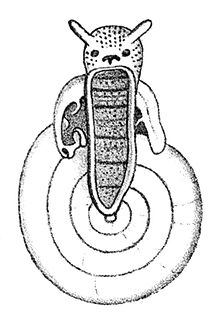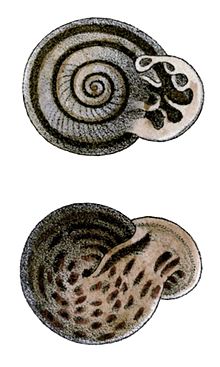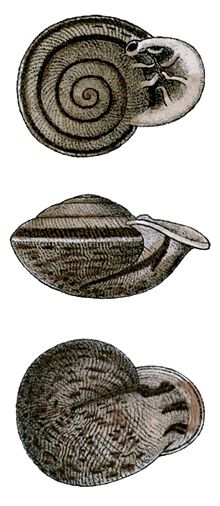| Ringicella | |
|---|---|

| |
| A drawing of a preserved specimen of Ringicella ringens showing how the snail carries the shell with the spire pointing downwards | |
| Scientific classification | |
| Kingdom: | Animalia |
| Phylum: | Mollusca |
| Class: | Gastropoda |
| (unranked): | clade Heterobranchia clade Euthyneura |
| Superfamily: | Orthalicoidea |
| Family: | Odontostomidae |
| Genus: | Ringicella Gray, 1847 |
Ringicella is a genus of tropical air-breathing land snails, terrestrial pulmonate gastropod mollusks in the family Odontostomidae.
Adult snails of this genus have an extremely unusual shell morphology, very similar to that found in the genus Anostoma Fischer von Waldheim, 1807, of which this genus was previously considered to be merely a subgenus.
The adult snails in this genus carry their shells upside down, with the spire or apex at the bottom, and the umbilicus at the top.
Shell description


The shell of Ringicella is very similar to that of Anostoma.
Shells of the genus Ringicella have an additional feature: the angular lamella and upper suprapalatal fold are concrescent, forming a perforation in the lip at its upper end.
In addition, the apertural rim incorporates a small tube, which communicates with the interior of the shell.
The width of adult shells varies from 18 to 25 mm.
Anatomy


This section is based on the anatomy of Ringicella ringens, which is also valid for the genus Anostoma (according to 1901 information from Pilsbry).
Unlike the shell, the soft anatomy is not especially peculiar, in so far as it is known from Dr. Paul Fischer's (1857) account of Ringicella ringens.
Radula
The jaw and teeth are as they are in Macrodontes. The radula of Ringicella (and also Macrodontes) is rather aberrant for Bulimulinae: the central and lateral teeth have no side cusps, the marginals have an ectocone; the basal plate is short. The jaw is smooth, arcuate. The teeth are as in the terrestrial Holopoda (see taxonomy of Holopoda) generally, the centrals and laterals with single broad cusps, marginals short, with the ectocone developed.
Genitalia
The genitalia are essentially similar to those of Odontostomus. The genitalia are exceedingly lengthened in Ringicella. The genitalia are of the haplogonous type, the long slender penis passing into a long vas deferens, upon which the penis retractor muscle is inserted; the duct of the globular spermatheca is extremely long. The elongation of the whole genital system is greater than in Helicoid snails generally, and doubtless correlated with the unusual length of the last whorl.
Araujo (1963) described male copulatory organs of Ringicella ringens as spirally coiled, that is different from previous description by Fischer and by Pilsbry.
Central nervous system
The cerebral ganglia are more separated than usual in the Holopoda. The cerebral ganglia are connected by a short narrow commissure; the suboesophageal ganglia are as usual in the Bulimulinae.
Distribution
This genus of snails occurs in Brazil.
Pilsbry (1901) mentioned Ringicella carinatum as also occurring in Colombia, in high forests of the Magdalena river basin at 1830 m (6000 feet) above sea level, but Vera Ardila (2008) considers the presence of the species in Colombia to be doubtful.
Species
Species within this genus include:
- Ringicella carinatum (Pfeiffer, 1853) - synonym: Anostoma carinatum Pfeiffer, 1853
- Ringicella luetzelburgi (Weber, 1925) - synonym: Anostoma luetzelburgi (Weber, 1925)
- Ringicella ringens (Linnaeus, 1758) - synonyms: Anostoma ringens (Linnaeus, 1758), Anostoma globulosa Lamarck, 1822, Anostoma globulosum Lamarck, 1822
References
The article incorporates public domain texts from the reference
- ^ Pilsbry H. A. 1901. in Tryon G. W. & Pilsbry H. A. 1901-1902 - Oriental Bulimoid Helicidae. Odontostominae. Cerionidae Volume 14. Manual of Conchology. Second series: Pulmonata. page 25–28 and 109–114. The article incorporates public domain texts from this reference.
- http://content.lib.washington.edu/cgi-bin/viewer.exe?CISOROOT=/fishimages&CISOPTR=48529&CISORESTMP=&CISOVIEWTMP=&CISOMODE=thumb
- Fischer, P. & H. Hupé. 1857. Description de deux espèces nouvelles du genre Anostoma Fischer. Journal de Conchyliologie, Paris, 5: 330-354, pl. 12, figs. 1-2.
- J. L. de Barros Araujo 1963. SOBRE ANOSTOMA (RINGICELLA) RINGENS (L., 1758) (Gastropoda, Pulmonata, Odontostomidae). Mem. Inst. Oswaldo Cruz, 61(1): 149-152.
- Mónica Lucía Vera Ardila. 2008. Lista de los géneros de moluscos terrestres de Colombia (Mollusca: Gastropoda: Prosobranchia: Mesogastropoda y Pulmonata: Stylommatophora). Biota Colombiana 9 (1): 39-62.
- Lamarck, J.B.P.A. 1819-1822. Mollusques In Histoire Naturelle des Animaux sans vertebres. Paris. 6 (1): 1-343 (1819), (2): 1-232 (1822). page 101.
- 1866. Catalogue of the genera Helix, Anostoma, Hypselostoma, Streptaxis, Tomigerus, Bulimus, Orthalicus, Partula, in the collection of A.D. Brown, Princeton, New Jersey
| Taxon identifiers | |
|---|---|
| Ringicella | |